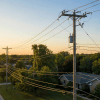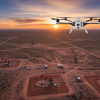The pandemic is not only changing the way we use technology, it’s fundamentally redefining our relationship with it. The way we feel about Zoom and Slack today will affect the way we feel about self-driving cars, AI-powered companions, and yes – autonomous drones – tomorrow.
Coronavirus lockdowns forced us to work, interact, shop, and play primarily via technology. It made us think long and hard about tools that can enable maximum human productivity with minimum risk of infection. And the answer, in many cases, was autonomous technology. Our historical fear of letting machines do the thinking – so to speak – was quickly overcome by simple practicality.
Where Did Fear of Autonomous Tech Come From?
Dystopian themes in art and literature have been popular for decades – with evil AI and autonomous technology playing leading roles. In film (think The Terminator series), books (the Dune series, for example), and television (think Westworld) – we are constantly witnessing how autonomous technology can go very, very wrong. This – together with a deeply instilled human fear of paradigms that take us out of our comfort zone – led us to collectively perceive more risk than benefit from autonomous technology.
The images of robots stealing human jobs and AI-powered robots taking control of the earth contributed to widespread opposition to – for example – self-driving cars. This fear also played a role in the slow regulatory embrace of autonomous vehicles, and even to actual violence against vehicles themselves. Certainly, legitimate and valid technological concerns were in play, too – yet the influence of fear is undeniable.
Up Close, We See There’s Less to Fear
During the Coronavirus crisis, we received an up-close and personal glimpse of the good side of autonomous technology. Just when we needed it most, we had to trust autonomous technology to transport medical supplies and patients, track instances of infection, conduct risk-free disinfection, and secure critical infrastructure while human staff were unavailable. It even helped keep us company in our isolation and social distancing.
All of a sudden, an autonomous Uber became less scary than the possibility of infection from the human driver of a traditional Uber. At Percepto, we saw the same change in attitudes from our industrial clients – many of whom either adopted or expanded their use of our autonomous drones as their facilities were shut down or their employees were unavailable owing to lockdowns.
Where Do We Go from Here?
The COVID-19 pandemic was a watershed for so many aspects of society. One of them will undoubtedly be autonomous technology and our attitudes to it.
In the near future, autonomous technology will continue to play a greater role behind the scenes of our day-to-day lives. Industrial robots will increasingly operate assembly lines. Remotely-operated autonomous drones will monitor and secure more and more power plants, gas and oil facilities, and other critical infrastructure.
Lockdowns and quarantines may pass – but the new culture of work-at-home is here to stay. This means more autonomous drone deliveries in general, and more ground-based deliveries for essentials like groceries – where companies are already running real-world trials. It also means more backend logistics automation to enable companies like Amazon to keep up with growing demand. And it even means more automation of the less sexy but truly necessary mechanisms of society – like autonomous waste management technology that would eliminate the need for human garbage collectors to be exposed to potentially infectious waste.
The Bottom Line
As people fear autonomous technology less, they will increasingly understand that it offers far more than convenience and safety. Data created by autonomous technology drives smarter decision-making and impacts business strategy, financial decisions, and even public health policy. Autonomous technology was moving mainstream before the Coronavirus hit. In our search for societal tools that enable maximum human productivity with minimum risk of infection – autonomous technology may be one of humanity’s most powerful weapons.





